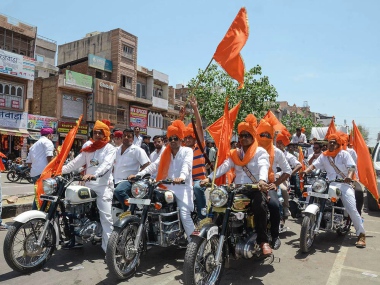This essay is part of Firstpost’s ‘India and the Indian’ series, which examines the renewed idea of nationalism in vogue today, and what it means. Read more from
this series . It is excerpted from the introduction to ‘
Majoritarian State: How Hindu Nationalism is Changing India’, edited by Angana P Chatterji, Thomas Blom Hansen and Christophe Jaffrelot, with due permission from HarperCollins India. *** The 2014 elections witnessed the culmination of the Bharatiya Janata Party’s (BJP’s) longstanding efforts to rule India. This second ascent of the BJP to power in New Delhi was markedly different from its first under the prime ministership of AB Vajpayee (1998–2004). The triumph of the BJP in 2014 brought about two unprecedented events: never had the Hindu nationalist movement won an absolute majority in the Lok Sabha, the lower house of parliament, and never had this movement, known for its hostility to the personalisation of power and for its collegial governance, been so influenced by one politician, Narendra Modi. The new dispensation combined four features that have also emerged in other countries in recent years, including in Donald J Trump’s America: populism, nationalism, authoritarianism, and majoritarianism. The majoritarian dispensation in India combines two further elements: the implementation of a more unvarnished pro-corporate and pro-upper caste compound of policies than ever before, paired with the normalisation of anti-minority rhetoric, routine assertions of the imminent danger posed by internal as well as external enemies to the nation, and a systematic deployment of false claims and partisan facts. The vision of a Hindu majoritarian polity held by the Rashtriya Swayamsevak Sangh (RSS) and the BJP combines cultural nationalism and political strategies aiming at flagrant social dominance by the upper castes, rapid economic development, cultural conservatism, intensified misogyny, and a firm grip on the instruments of state power. Modi’s neo-sultanism Nationalism is the bedrock of most populists and Modi is no exception. Modi is a product of the RSS and has clearly shown his deep commitment to the Hindutva doctrine, but he did not emphasise this aspect of his personal convictions during the 2014 campaign. He hardly needed to. The organised mass violence of 2002 in Gujarat, which had resulted in a pogrom against Muslims when he was chief minister, had already earned him the status of a ‘Hindu Hriday Samrat’ (Emperor of the Hindu Heart). Following the pogrom in Gujarat in 2002, Hindu majoritarianism was further consolidated across various states; through orchestrated attacks on minorities in Orissa in 2007 and 2008 and in Muzaffarnagar in 2013. The legitimacy of such Hindu domination harked back to their autochthony, while also augmenting their numbers. Hence, majoritarianism is inherent to Modi’s populism because the people he claims to represent are made up of Hindus only. The main goal of the BJP is to ‘defend’ the interests of Hindus first and foremost, at the expense of the rights of the Othered/minorities in the country. Majoritarian national-populists are authoritarian by definition, since they claim that they embody the people and as the people can only be one/singular, there is no room for pluralism. This explains their tendency to disqualify their adversaries as ‘anti-national’ or even traitors, and even reject the multiparty system of democracy. The BJP has made it clear that no other party should compete with it, or is even needed, as indicative from its slogan of a ‘Congress Mukt Bharat’ (a Congress-free India). While Modi exemplifies the authoritarian, majoritarian, national-populists of today, his regime is not merely sultanistic. India continues to organise reasonably free and fair elections; its government interferes with the appointment of judges but cannot prevent the most independently-minded lawyers from attempting to do their jobs; the government and the BJP influence and curtail the media but indirectly, not via official censorship. If anything, Modi is a ‘neo-sultan’ who observes some facets of democracy while pushing India further towards an illiberal ethnic democracy.
The minority is now officially reconfigured as an obstacle to development, a drain on resources, an alien and socially divisive element that weakens cultural cohesion; a primitive, non-modern and unassimilable remnant of the past.
Advertisement
End of Article


)

)
)
)
)
)
)
)
)



